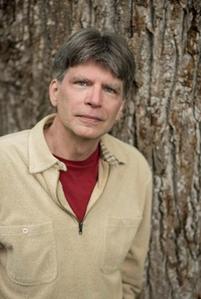 |
|
| (photo: Dean D. Dixon) | |
Richard Powers's novels include The Echo Maker (winner of the National Book Award for Fiction, 2006) and The Overstory (Pulitzer Prize for Fiction, 2019). His work often explores the connections between human lives, the natural world, science and technology. He has received a MacArthur Fellowship, a Lannan Literary Award and the James Fenimore Cooper Prize for Historical Fiction, among many others, and he has taught at Stanford University and the University of Illinois. Bewilderment (available now from from Norton) is his 13th novel.
Powers wrote a special "Note from the Author" for the advanced reader copies of Bewilderment that explores the meaning of his novel's title and inspiration, reprinted here.
I read the classic "Flowers for Algernon" in sixth grade, when I was eleven years old. Written the year I was born, the story lit up my imagination and settled into that permanent place children reserve for those fables that capture the mystery of life.
In my early sixties, when I came across an account of a remarkable new therapeutic technique called decoded neurofeedback, Daniel Keyes's story returned to me, every bit as vivid as it had been half a century earlier. "Algernon" told of a cognitively challenged man who is granted intelligence far beyond ordinary human limits. Decoded neurofeedback raised the prospect of a similar fable. Suppose researchers perfected an empathy machine that could greatly magnify emotional intelligence? What might we humans learn to become?
Children possess enormous emotional intelligence, but adult illogic can defeat it. While finishing my previous novel, The Overstory, I kept reading accounts of the toll our growing environmental catastrophe is taking on the young. A new word, solastalgia, seemed to take hold overnight. I began to see how we were raising a generation of troubled kids born homesick for a place they never knew. And we adults were relying more and more on a single response for treating the epidemic ravaging our children's mental health: medication.
All children are natural scientists. At the same time, they're also pantheists who know that God is crawling over every inch of the backyard. I had a fierce niece who loved butterflies, and for a long time couldn't stop drawing them. I had a deeply affectionate nephew who talked to "critters," but who flew into violent rages at the stupidity of humans. The little girl managed to grow into an accomplished and mostly happy young adult. The little boy did not. Could another kind of emotional therapy have made a difference?
Bewilderment was, in part, my way of remembering those two, along with so many other troubled children whom I loved without being able to reassure. The reward of writing this story lay in the daily chance to recover my own childhood joy in the endless replenishment of the living world. The word bewilder means to perplex or confuse. But in its origin, it also means to head back into wildness. A childlike love for our wild, entangled home is the only thing large enough to cure what is wrong with us. As Thoreau puts it, "In wildness is the preservation of the world."
Copyright (c) 2021 by Richard Powers. Bewilderment to be published by W.W. Norton & Company, Inc. September 21, 2021.

